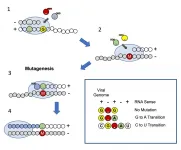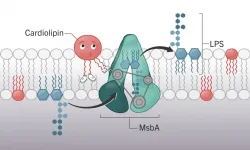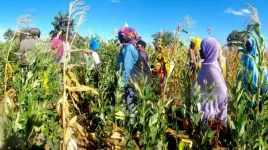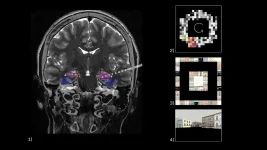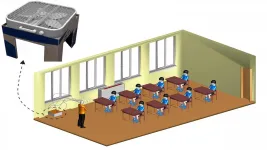(Press-News.org) A University of Alberta virology lab has uncovered how an oral antiviral drug works to attack the SARS-CoV-2 virus, in findings published May 10 in the Journal of Biological Chemistry.
The researchers demonstrated the underlying mechanism of action by which the antiviral drug molnupiravir changes the viral genome, a process known as excessive mutagenesis or “error catastrophe.”
“The polymerase, or replication engine of the virus, mistakes molnupiravir molecules for the natural building blocks required for viral genome replication and mixes them in,” explained Matthias Götte, professor and chair of the Department of Medical Microbiology & Immunology in the Faculty of Medicine & Dentistry and member of the Li Ka Shing Institute of Virology. “It causes the polymerase to make sloppy copies—nonsense genomes that are useless and not viable.”
Molnupiravir is currently in Phase 3 human clinical trials, which are expected to report preliminary data by the end of June. Phase 2 trial results recently revealed that the drug eliminated SARS-CoV-2 infectivity in newly diagnosed patients after five days of treatment.
The drug is taken as a pill, making it much easier to administer than other approved treatments such as remdesivir or monoclonal antibodies, which must be given intravenously. It has not yet been shown to be effective in treating hospitalized COVID-19 patients with advanced disease, so current trials are focused on determining how well it works for newly diagnosed patients. It is hoped the drug could also be used as a preventive measure to protect household members against infection.
“Molnupiravir is one of the few compounds under investigation that is orally available,” Götte said. “Data reported so far demonstrate that this drug is well tolerated with no signs of severe side-effects, and it shows an antiviral effect after five days. Whether it can also reduce hospitalizations remains to be seen.”
“Our work to demonstrate that the effect of the drug is indeed mediated by the viral polymerase is reassuring, because if the drug somehow generates mistakes in the virus and you don’t know how it happens, there could be other mechanisms at work that could also harm the cell,” he said. “Still, the safety of the drug for COVID-19 patients remains to be evaluated and monitored."
Another step in the hunt for a weapon against future pandemics
Molnupiravir was first identified as a broad spectrum antiviral at Emory University in Atlanta, Georgia. In 2003 it was developed as a treatment for chronic hepatitis C, but it was dropped due to possible side-effects associated with long-term use. The drug was then tested in humans with influenza, because the course of treatment for flu is much shorter. The focus of testing switched to SARS-CoV-2 after the COVID-19 pandemic emerged. The drug is now being developed in partnership by Merck and Ridgeback Biotherapeutics.
Merck has made deals with five generic drugmakers in India to make molnupiravir, and at least one of them has applied for approval to use it on an emergency basis, as at least 350,000 new infections are diagnosed in that country every day and vaccination levels are low.
Götte and his team previously uncovered the mechanisms of action for remdesivir, a now-approved treatment that inhibits replication of the SARS-CoV-2 virus, and baloxavir, an influenza drug.
Next, they will test molnupiravir’s mechanism of action against the polymerases of some of the other viruses the World Health Organization has identified as having high epidemic potential.
“All are recognized as emerging pathogens where we need to develop countermeasures,” Götte said. “We need to be prepared with broad-spectrum antivirals that can serve as a first line of defence.”
“Even once vaccines are developed, we can’t get them into all the arms at once,” he said. “To really fight outbreaks and epidemics, one tool is unlikely to be sufficient.”
The researchers were supported by grants from the Canadian Institutes of Health Research, the Alberta Ministry of Jobs, Economy and Innovation, and the U.S. National Institutes of Health Centers for AIDS Research. The other authors were graduate student Calvin Gordon and research associate Egor Tchesnokov of the U of A, and Raymond Schinazi of the Emory School of Medicine.
Lab reveals how an oral antiviral drug confuses the replication machinery of SARS-CoV-2
Molnupiravir under consideration for emergency use in India to slow explosive spread of COVID-19 infections.
2021-05-11
ELSE PRESS RELEASES FROM THIS DATE:
Social isolation has a profound and increasingly negative impact on physical functioning in older adults
2021-05-11
Ann Arbor, May 11, 2021 - Social isolation among older adults is associated with poor health and premature mortality, but the connection between social isolation and physical functioning is poorly understood. New research generates more robust evidence about the associations between social isolation and physical functioning and how this accelerates over time, reports the American Journal of Preventive Medicine, published by Elsevier. It also highlights the importance of incorporating strategies to reduce social isolation and promote successful aging.
"Physical functioning is understood to influence the health of individuals. And social isolation is prevalent among older adults," ...
Ultrasensitive antigen test detects SARS-CoV-2 and influenza viruses
2021-05-11
Researchers at UC Santa Cruz have developed a novel chip-based antigen test that can provide ultrasensitive detection of SARS-CoV-2 and influenza A, the viruses that cause COVID-19 and flu, respectively.
The test is sensitive enough to detect and identify individual viral antigens one by one in nasal swab samples. This ultrasensitive technique could eventually be developed as a molecular diagnostic tool for point-of-care use. The researchers reported their findings in a paper published May 4 in Proceedings of the National Academy of Sciences.
"This is a chip-based biosensor capable of detecting individual proteins one ...
Key steps could reduces cases and deaths from rheumatic heart disease in the African Union
2021-05-11
Rheumatic heart disease (RHD) remains a major cause of cardiovascular disease in Africa, even as acute rheumatic fever and RHD have become rare in high-income countries. In a new study led by investigators at Brigham and Women's Hospital, the team modeled the investment case for control of RHD in the African Union (AU) region. Results showed the potential to reduce RHD death by almost a third by increasing coverage of RHD interventions in regions of the AU to 2030, with a high return on investment in both the long and short term. Their results are published in The Lancet Global Health.
"Investing in early detection of rheumatic fever and rheumatic heart disease and providing cardiac surgery to those who need it ...
Researchers find target to fight antibiotic resistance
2021-05-11
Gram-negative bacteria are the bane of health care workers' existence.
They're one of the most dangerous organisms to become infected with--and one of the hardest to treat. But new research from the University of Georgia suggests a component of bacteria's cell walls may hold the key to crushing the antibiotic-resistant microbes.
The reason Gram-negative bacteria are difficult to kill is their double cell membranes, which create an almost impenetrable shield of protection. This shield blocks antibiotics from entering, preventing medications from doing their job of destroying the bacteria. Meanwhile, toxic molecules, known as lipopolysaccharides, on the surface of the bacteria's outer membrane provoke a potentially deadly immune response.
In ...
Tanzanian farmers boost diets with sustainable methods
2021-05-11
ITHACA, N.Y. - A project based in Tanzania found significant improvements in the diversity of children's diets and food security for households after farmers learned about sustainable crop-growing methods, gender equity, nutrition and climate change from peer mentors.
The farmers experimented with practices introduced to them by Malawian farmers and Tanzanian and American scientists, decided which ones to incorporate within their own farms, and met monthly to share experiences and problem-solve.
The three-year study builds on longer-term research where these environmentally-friendly farming methods, called agroecology, combined with peer-mentoring and farmers collaborating in the process, had successfully improved adult nutrition in Malawi.
"There were a lot of questions about whether ...
How do you rate your medical care? Your answer might be affected by your insurance
2021-05-11
May 11, 2021 - For patients seen at a urology clinic, patient satisfaction scores vary by insurance status - with higher scores for patients on Medicare and commercial insurance, but lower scores for those on Medicaid, reports a study in Urology Practice®, an Official Journal of the American Urological Association (AUA). The journal is published in the Lippincott portfolio by Wolters Kluwer.
"Our study adds to previous evidence showing patient satisfaction scores are affected by the type of insurance - not just by the quality of care provided," comments senior author Werner de Riese, MD, PhD, Chair of the Department of Urology of Texas Tech University Health Sciences Center ...
For the brain, timing is everything
2021-05-11
Columbia Engineering/UCLA team is first to demonstrate that phase precession plays a significant role in the human brain, and links not only sequential positions, as seen in animals, but also abstract progression towards specific goals.
New York, NY--May 11, 2021-- For decades the dominant approach to understanding the brain has been to measure how many times individual neurons activate during particular behaviors. In contrast to this "rate code," a more recent hypothesis proposes that neurons signal information by changing the precise timing when they activate. One such timing code, called phase precession, is commonly observed in rodents as they navigate through spaces and is thought to form the ...
Box fan air cleaner greatly reduces virus transmission
2021-05-11
WASHINGTON, May 11, 2021 -- Improved ventilation can lower the risk of transmission of the COVID-19 virus, but large numbers of decades-old public school classrooms lack adequate ventilation systems. A systematic modeling study of simple air cleaners using a box fan reported in Physics of Fluids, by AIP Publishing, shows these inexpensive units can greatly decrease the amount of airborne virus in these spaces, if used appropriately.
A low-cost air cleaner can be easily constructed from a cardboard frame topped by an air filter and a box fan. The air filter is placed between the fan and the cardboard base. The fan is oriented so that air is drawn in from the top and forced through ...
8 Out of 10 people hospitalized with COVID-19 develop neurological problems
2021-05-11
PITTSBURGH, May 11, 2021 - Patients with clinically diagnosed neurological symptoms associated with COVID-19 are six times more likely to die in the hospital than those without the neurological complications, according to an interim analysis from the Global Consortium Study of Neurologic Dysfunction in COVID-19 (GCS-NeuroCOVID).
A paper published today in JAMA Network Open presents early results of the global effort to gather information about the incidence, severity and outcomes of neurological manifestations of COVID-19 disease.
"Very early on in the pandemic, it became apparent that a good number of people who were sick enough to be hospitalized also develop neurological problems," said lead author Sherry Chou, ...
Global incidence of neurological manifestations among patients hospitalized with COVID-19
2021-05-11
What The Study Did: This global observational study included patients with COVID-19 representing 13 countries and four continents, and its findings suggest neurological manifestations are prevalent among patients hospitalized with COVID-19 and associated with higher in-hospital death.
Authors: Sherry H-Y. Chou, M.D., M.Sc., of the University of Pittsburgh School of Medicine, is the corresponding author.
To access the embargoed study: Visit our For The Media website at this link https://media.jamanetwork.com/
(doi:10.1001/jamanetworkopen.2021.12131)
Editor's Note: The article includes conflict of interest and funding/support disclosures. Please see the article for additional information, ...
LAST 30 PRESS RELEASES:
Invisible battery parts finally seen with pioneering technique
Tropical forests generate rainfall worth billions, study finds
A yeast enzyme helps human cells overcome mitochondrial defects
Bacteria frozen in ancient underground ice cave found to be resistant against 10 modern antibiotics
Rhododendron-derived drugs now made by bacteria
Admissions for child maltreatment decreased during first phase of COVID-19 pandemic, but ICU admissions increased later
Power in motion: transforming energy harvesting with gyroscopes
Ketamine high NOT related to treatment success for people with alcohol problems, study finds
1 in 6 Medicare beneficiaries depend on telehealth for key medical care
Maps can encourage home radon testing in the right settings
Exploring the link between hearing loss and cognitive decline
Machine learning tool can predict serious transplant complications months earlier
Prevalence of over-the-counter and prescription medication use in the US
US child mental health care need, unmet needs, and difficulty accessing services
Incidental rotator cuff abnormalities on magnetic resonance imaging
Sensing local fibers in pancreatic tumors, cancer cells ‘choose’ to either grow or tolerate treatment
Barriers to mental health care leave many children behind, new data cautions
Cancer and inflammation: immunologic interplay, translational advances, and clinical strategies
Bioactive polyphenolic compounds and in vitro anti-degenerative property-based pharmacological propensities of some promising germplasms of Amaranthus hypochondriacus L.
AI-powered companionship: PolyU interfaculty scholar harnesses music and empathetic speech in robots to combat loneliness
Antarctica sits above Earth’s strongest “gravity hole.” Now we know how it got that way
Haircare products made with botanicals protects strands, adds shine
Enhanced pulmonary nodule detection and classification using artificial intelligence on LIDC-IDRI data
Using NBA, study finds that pay differences among top performers can erode cooperation
Korea University, Stanford University, and IESGA launch Water Sustainability Index to combat ESG greenwashing
Molecular glue discovery: large scale instead of lucky strike
Insulin resistance predictor highlights cancer connection
Explaining next-generation solar cells
Slippery ions create a smoother path to blue energy
Magnetic resonance imaging opens the door to better treatments for underdiagnosed atypical Parkinsonisms
[Press-News.org] Lab reveals how an oral antiviral drug confuses the replication machinery of SARS-CoV-2Molnupiravir under consideration for emergency use in India to slow explosive spread of COVID-19 infections.
